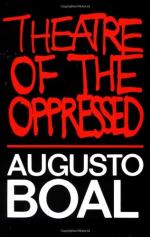|
This section contains 513 words (approx. 2 pages at 400 words per page) |

|
Chapter 3, Hegel and Brecht: The Character as Subject or the Character as Object?, The Summary and Analysis
In "The 'Epic' Concept", Boal states that the use of old words in new ways creates misunderstanding about Marxist changes in the theater. Bertolt Brecht used the term epic theater, while Aristotle spoke of epic poetry, which recalls the past in a long form and specific form of verse. Erwin Piscator defined epic as a theater that incorporated multimedia elements to create a sense of the work's reality. Boal says that the term epic is now only applied to films taking place in the open air, with many characters and much combat. Brecht's use of the term is in reaction and opposition to Hegel.
In "Types of Poetry in Hegel", Boal discusses Hegel's concept of...
|
This section contains 513 words (approx. 2 pages at 400 words per page) |

|




